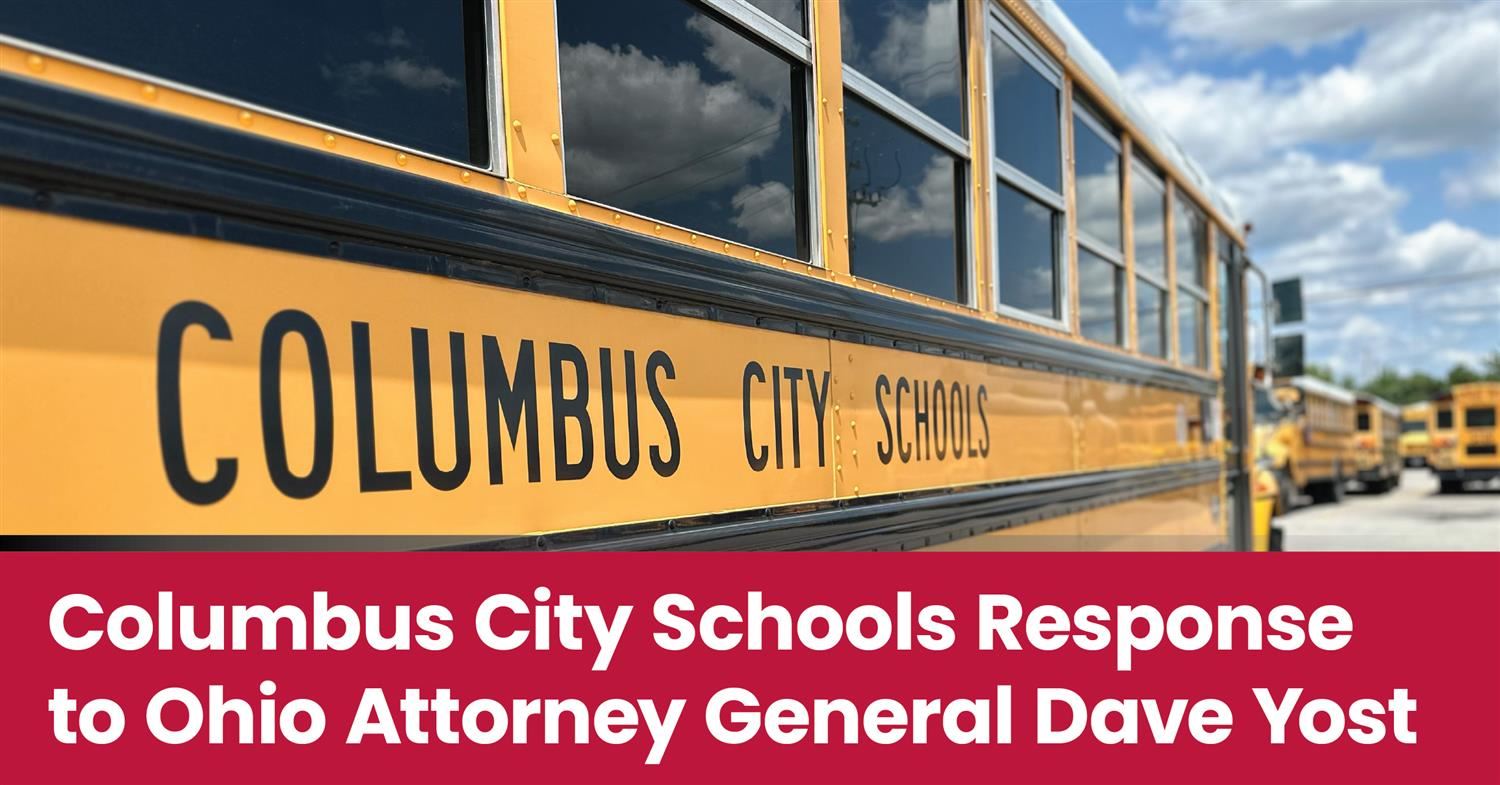- Columbus City Schools
- Homepage
Columbus City Schools Response to Ohio Attorney General Dave Yost

September 5, 2024
Dave Yost
Ohio Attorney General
Administration Office
30 E. Broad Street, 17th Floor
Columbus, OH 43215
In reference to your September 3, 2024, letter, CCS believes its actions are consistent with the laws promulgated by the General Assembly and is complying with its legal obligations to transport students.
As a point of information, due to circumstances beyond its control, CCS found it necessary to re-evaluate its transportation operations. Even with improved efficiencies, the re-evaluation led to the realization that it was untenable for CCS to continue to transport students that it is not required to transport. At present, CCS is transporting approximately 37,000 students. This number includes approximately 9,000 community and nonpublic school students who have been deemed eligible and practical to transport. CCS, and contracted vendors, cover 470 routes. For context, these routes include transportation to 113 CCS school buildings and up to 167 community and nonpublic school buildings.
Your letter conflates the ineligibility for transportation determinations, under R.C. 3327.01, with the impractical to transport determinations under R.C. 3327.02. These two statutes involve different decision-making processes and remedies available to the families of students.
CCS staff is working with the Ohio Department of Education and Workforce (“ODEW”) and families daily regarding CCS’s determinations. R.C. 3327.01, which is commonly known as the 30-minute rule, specifically permits CCS, and all Ohio public school districts, to determine that a student is ineligible for public school district transport if “such transportation would require more than thirty minutes of direct travel time as measured by school bus from the public school building to which the pupils would be assigned if attending the public school designated by the district of residence.”
The Columbus City School District does not discriminate based upon sex, race, color, national origin, religion, age, disability, sexual orientation, gender identity/expression, ancestry, familial status or military status with regard to admission, access, treatment or employment. This policy is applicable in all district programs and activities.
CCS has no legal obligation to transport ineligible students under R.C. 3327.01 or 3327.02, and students deemed ineligible for transportation are not entitled to mediation and/or payment in lieu of transportation. Instead, either CCS or the student’s parent/or guardian can request an official timing to determine eligibility for CCS transportation. CCS and ODEW have coordinated a time schedule to conduct official timings upon request. If an official timing, conducted by ODEW, determines that the afore-mentioned distance is under 30 minutes, then an impractical to transport review is conducted.
As indicated previously, R.C. 3327.02 governs impractical to transport determinations. R.C. 3327.02(A) specifically provides that CCS “may determine that it is impractical to transport a pupil who is eligible for transportation” using the following 6 factors:
(1) The time and distance required to provide the transportation;
(2) The number of pupils to be transported;
(3) The cost of providing transportation in terms of equipment, maintenance, personnel, and administration;
(4) Whether similar or equivalent service is provided to other pupils eligible for transportation;
(5) Whether and to what extent the additional service unavoidably disrupts current transportation schedules;
(6) Whether other reimbursable types of transportation are available.
CCS, working with an outside consultant (Ohio School Board Association), believes that it has substantially complied with all the requirements set forth in R.C. 3327.02.
Your letter also references timelines. R.C. 3327.02(B) describes the process for making impractical to transport determinations. This section requires that such determinations be made not later than thirty (30) days before a community or nonpublic school is scheduled to begin classes, and the Superintendent made those determinations within the required time. After the CCS Board of Education passed the required Resolution to effectuate the Superintendent’s impracticality determinations, CCS issued letters, via certified mail, to the individual families with a description of the reasons for the Superintendent’s determination. The letter also included an offer for payment in lieu of transportation. Such an offer could only be made after the Board passed the above-referenced Resolution.
R.C. 3327.02(F), promulgated by the General Assembly, clearly sets forth the remedies available to families. It provides, in part, that if a public school district fails to provide transportation for impractical students during mediation, DEW shall order the school district to pay a fine, up to $2,500, to the student’s parent/guardian. The statute also authorizes DEW to implement a fine, if, following a Chapter 119 hearing, it is determined that it is not impractical to transport a student. Foremost, the statute provides for an adequate remedy at law for all parties.
Based on the above, your threat to file a lawsuit against CCS is an improper infringement upon CCS’s right to make ineligibility and impractical to transport determinations. Your threat to file a lawsuit against CCS also serves to usurp and circumvent the authority of the General Assembly, which promulgated the above-referenced statutes. Finally, your threat to file a lawsuit against CCS is also an infringement upon the equal rights of public school districts and community or nonpublic school parents/guardians to due process.
I am hopeful that my response to your letter provides clarity in this transportation matter. Thank you for your attention.
Sincerely,

James A. Barnes, Esq.

